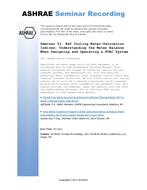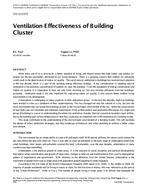The purpose of this study was to compare a large set of high-quality laboratory measurements with computational predictions made by the FSEC 3.0 simulation model for air distribution systems located in building spaces, specifically attics in this study.
ASHRAE research project 852-RP, “Comparison of Duct Computer Models That Could Provide Input to the Thermal Distribution Standard Method of Test (SPC-152P),” used analytical verification and inter-model comparison to evaluate selected duct computer models. Analytical verification determines the accuracy of the pertinent numerical solutions and algorithms employed by each model using a series of problems with known, exact analytical or benchmark solutions. Inter-model comparison compares results from a group of parametric simulations where the problems consisted of a series of interconnected building spaces. However, model validation comparing simulation results to actual measured data was beyond the scope of the project and is the subject of the present paper.
Duct system tests were performed at a U.S. national laboratory with controlled attic ventilation in a residential attic test module (RATM) located in a large-scale climate simulator (LSCS). The duct system in the RATM was attached to an independently controllable supply of conditioned air. Both summer and winter conditions were used in the LSCS, with the corresponding supply to the duct system either cool or warm air. Holes simulating air leakage sites at typical duct joints at the beginning, middle, and end of the duct system were opened and closed selectively to study the effect of air leakage into the attic space. Tests were conducted using both uninsulated and insulated ducts. Airflows and pressures in the duct system and temperatures in and around the RATM were monitored in all the tests.
The work described in this paper is a supplement to ASHRAE research project 852-RP. Simulation results using one of the selected duct computer models are compared to laboratory data under a variety of test conditions. The comparison shows that the model predicts duct air temperatures, pressures, and leakage airflows well. The model can be used with good confidence to simulate the thermal performance of air distribution systems.
Units: Dual
Citation: Symposium, ASHRAE Transactions, 1998, Vol. 104, Part 2, Toronto, ON
Product Details
- Published:
- 1998
- Number of Pages:
- 11
- File Size:
- 1 file , 270 KB
- Product Code(s):
- D-7746


